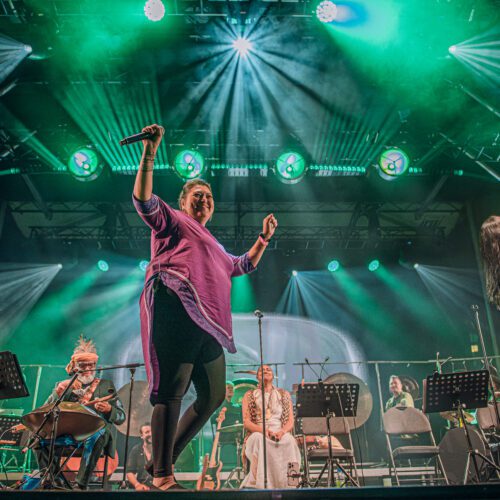There are albums whose positive effect on us we absolutely do not suspect before listening to them. We don’t know what to expect, we start listening and bam, we’re swept away by enthusiasm. Sublimation – Songs and dances from 18th-century Scandinavia by The Curious Bards is one of those. First, the cover is not really stimulating in the middle of summer (although it is objectively very beautiful): it looks like the announcement of a Christmas album. I know there is the concept of the camper’s Christmas, but no. And then, if Scandinavian folklore is very pretty, it leaves quite few precise echoes in our North American minds, other than songs and dances vaguely resembling our own local folklore and its direct sources, that of the British Isles (or also of France, for Quebec).
In short, the melodic beauty of the pieces, the quality of the interpretations, the energy and the communicative passion of the musicians of the French ensemble (of course, since they have an English name… I’m being ironic here) immediately strike you, moreover because you least expect it, and convert even the most reluctant to the trad thing. It must be said that the members of the group come from the best conservatories in the French world (Paris, Lyon and Basel in Switzerland), giving the chosen repertoire a breath of excellence that discerning music lovers will particularly appreciate.
The repertoire was gleaned from various manuscripts, many of which had never, or rarely, been consulted before. There is a very well-balanced collection of lively dances, ballads, and melancholic songs. There are even a few “polonaises,” proof of the numerous and fruitful exchanges between Scandinavia and Northern Europe (Poland, Germany, etc.) during the Baroque era, in the field of popular music. The Scandinavian artists of the time quickly adopted some of the new rhythms coming from neighboring Poland, such as, of course, the mazurka. There are also reels well informed by English or Irish examples, but adapted, of course, to the Nordic flavor. There are even waltzes, under the influence of Austria.
It’s fascinating to hear these hyper-catchy pieces and to notice the high level of cultural fusion that can be detected in them. But it is above all the high musical quality of the ensemble The Curious Bards and the Greek soprano (long live united Europe!) Ilektra Platiopoulou that strike our minds.
In truth, it is not at all surprising that this repertoire is, first of all, so sophisticated. Before the Romantic period, the notion of “learned” and “folk” music (or if you prefer, “high” vs “popular’’, or ‘’low’’) was virtually non-existent. Popular songs have been found in rural areas that actually came from operas performed in big cities like Stockholm. On the court side, popular dances were often enjoyed alongside the more “serious” compositions of composers like Kraus, even played by the nobles themselves.
We therefore understand why the interpretation of this repertoire by such perfectly trained artists is justified without resorting to the term “crossover.” What these curious bards are doing for the North is akin to what L’Arpeggiata and Christina Pluhar are doing for Italy. It’s just as important, and just as excellent.
The sound recording is spectacularly beautiful and natural, adding the final touch to an irresistibly attractive program.
A masterful album. We want more.
The Curious Bards
Alix Boivert, baroque violin and Hardanger
Colin Heller, baroque violin and kontrabasharpa
Jean-Christophe Morel, baroque cittern
Sarah Van Oudenhove, viola da gamba
Ilektra Platiopoulou, mezzo-soprano























